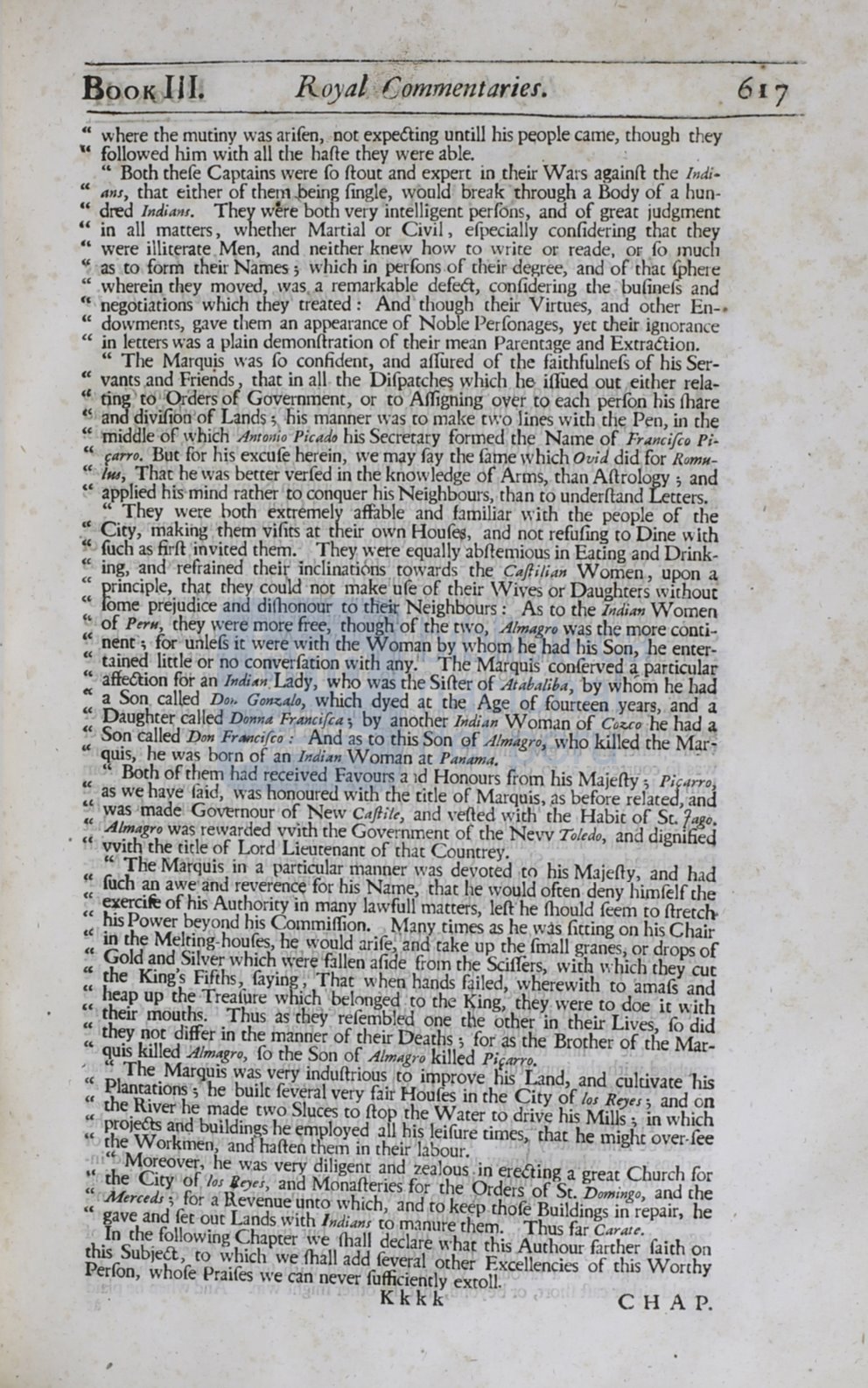

,BooK
III.
Royal
Commentaries.
" where
che
mutiny was arifen,
not
expeCl:ing untill
his
p~ople
came, though they
'' followed him
with
all the hafie
they
were able. .
. .
:
.
" Both thefe Captains were
fo
fiout
and
expert
10
their
Wars agamft the
lndi·
"
ans
that
either of
them
~eing
fingle, would break through a Body
?f
a hun–
" dred
Jndiam.
They
were
both very intel!i$ent perf
~ns,
and of
g~eat
JUdgment
" in all
matters whether Martial
or
C1v1l ,
efpecially confidenng that
they
'' were illiterate
'Men
and neither knew how
to
write
or reade, or
fo
much
'I
as
to
form their N;mes ; which
in
perfons of their degree, and of
that
fphere
" wherein they moved, was a remarkable defett,
co~fide~ing
the bufinefs and
'' negotiations
which
they created :
And
though
che1r
Virtues,
and other En–
'' dowmenrs, gave
chem
an appea:ance of
~oble
Perfonages,
yet
their ign?rance
'' in
letters was a plain demonfirauon of therr mean
Parenta~e
and
Extratl:~on.
" The
Marquis was fo confident, and aifured of the
fa1thfulnefs
of
hlS
Ser–
" vants .and ,Friends,
that
in
all the Dif
parches
which
he-
i{fued out either rela–
(C
ting ·to
·Oraers
of Government, or
to
Affigning
over
to
each perfon his !hare
'' and
divifion ·of
Lands? nis manner was ro make
t\~
o lines with the Pen,
in
the
" middle
of which
Antonio Picado
his Secretary formed
the
Name of
Fr11ncifco Pi·
''
farro.
But for his excufe herein, we may
fay
the fame
which
Ovid
did for
Rom11-
" '
Im,
That he was
better
verfed in the
knowledge
of Arms, than All:rology;
and
'' applied
Ms mind
rather
to
conquer
his
Neighbours, than to
underfl:and
Letters.
" They were both
extremely
affable and familiar with the people of the
'' City,
making them
vifits
Clt
their own
Houf~,
and not refufmg
to
Dine
wlth
.
" fuch as
firft
invited them. They were equally abftemious
in
Eating and Drink-
" ing, and refrained their inclinati6os towards the
Cajfilian
Women, upon
a
" principl_e,
cha~
rhey could not make ufe of their \Vives or Daughters without
c~
fome prejudice
and
difhonour
to
theit:
Neighbours: As
to
the
Indi11n
Women
'' of
PerH,
they were more free, though of the two,
Almagro
was
the
more conti-
'' nent; for urile!S
it
were with the Woman
by
whom he had his Son, he enter-
" tlined little or no converfation with
any.
The Marquis conferved; particular
" ctffecnon for an
Indi"n
Lady,
who
was the Sifier of
Ataba!iha,
by whom he had
«
a Son
called
Do1" Gom:.4/0,
which dyed at the Age of fourteen years, and a
" Daughter
cal
led
Donna Francifca
;
by
anorher
Indian
Woman
of
Co:uo
be had
a
" Son called
Don
Franci[co :
And as to
this
Son
ef
A!m~gro,
who
killed
the Mar-
,, quis, he was born of an
Indian
Woman at
Panama.
-
'' Both of chem had received Favours a id Honours from his Majefry
~
Pifarro,
" as we
have faid, was honoured with the title of Marquis, .as before
related,
and
'~
was made Govemour of
New
Caftile,
and
'eiled
with the Habit of St.
[ago.
"
Almagro
was rewarded vvith the Government of the Nevv
Toledo,
and dignifiecl
.· " vvith the tide of Lord Lieutenant of
that
Councrey.
" The Marquis in a
particular
manner was devoted
to
his Majefiy, and
had
~
fuch an
awe·
and
reverencf;
for
his Name_,
chat
he would often deny himfelf the
" qercift
of
his
Authority in many lawfull matters, leffhe iliould feem to ftretch–
" his
Power beyond his Commiffion. Many times as he was fitting on his Chair
'' in
the Melriog-houfes, he would
arife~
·and take up the fmall granes, or drops of
" Gold and
Silver
which werefallen_afide from the
Sciffers,
with
which
they cue
" the King's Fifrhs, faying, That when bands failed, wherewith
to
arnafS and
" hea_p up the Treafure which belonged to
the
I\:ing, they were to doe it "ith
" their mouths. Thus
ClS
they
refembied one rt\e
other
in
their Lives fo did
" they
not
differ
in the manner of their Deaths; for as the Brother of the
Mar–
,, quis killed
Almagro,
fo the Son of
Alm11gro
killed
f
ifarro.
"
~'
The
Marquis
was very indufrrious
to
improve liis Land, and cultivate his
::
Plant~tions;
he built feveral very
fair
Houfes
in
the
City
of
los Reyes;
and on
the_River ·he made two Sluces to fiop the Water
to
drive his Mills. in which
"
~ro1elts
ang
buildin_gs he employed all
his
Ieifure times,. that he might
over·
fee
" the Workmen, and hafien them in their labour.
,, th''"
Mo~eover,
he was very diligent and
zealous
in
ereding
a great Church for
"
e
City·
of
lo.r JI.eyes,
and
Mon~eries
for the Orders of St.
Domingo,
and
the
Merceds;
for a Revenue unto which, and to keep thofe Buildings in repair he
'' gave
and
fee
~ut
Lands
with
lndian.r
to
manure
them.
Thus far
Carate.
'
.In
the. followmg
~hapter
we fhall declare what this Authour farther faith on
this Sub1eet, to
~h1ch
we <hall add feveral other Excellendes of this Worchy
Perfon, whofe
Pra1fes
we can never fufficient1y exroll.
K
kk k
·
CH AP.
,














